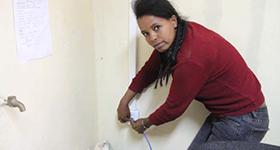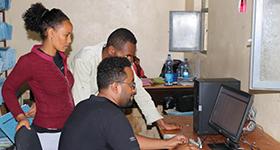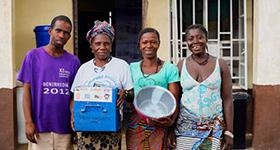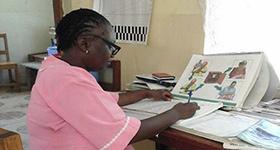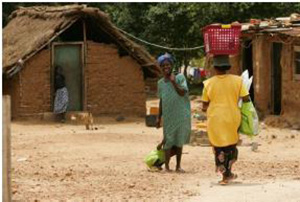
Photo Credit: HealthKeepers Network
Background
The HealthKeepers Network (HKN) program was initiated as a response to the call for greater access to life-saving health products and information for the underserved and the rural poor populations. It represents an alternative distribution strategy that seeks to integrate a private sector business approach to increase the use of health protection products—including reproductive health and HIV prevention commodities. It addresses bottlenecks in product delivery and creates a smart business opportunity for trained and motivated community-based agents.
Intervention
The HKN program is modeled after a door-to-door sales approach—a community member is recruited and trained to become a local sales representative or a “HealthKeeper,” for a line of health products including condoms and oral contraceptives pills. The HealthKeepers go the last mile—right to the doorstep—to sell the basic health-promoting products, especially for women and children. Each HealthKeeper receives training on the products they carry so that they can counsel their customers on their proper use.
Outcomes
The core products distributed through the HKN program support improved health and better nutrition—contraceptives, insecticide-treated mosquito nets, household water treatment tablets, oral rehydration solution, reading glasses, iodized salt, and hand washing soap.
HealthKeepers are able to provide counseling to their neighbors on topics such as modern family planning methods, how to use condoms to prevent unwanted pregnancies and HIV, how to treat the home water supply to make it safe for drinking, how to recognize that a child is dehydrated and how a combination of Zinc tablets and oral rehydration solution can help. According to Elizabeth Kudeka of Ewutu Ofada,
“Now in my community I am regarded as very resourceful in terms of reproductive health and other health related issues, so if anyone needs help in that field I am the one they come to look for.”
HealthKeepers also offer personal care and other health products that are popular locally, such as acceptable pain killers, nutritional supplements, bandages, feminine supplies, toothpaste, and brushes.
Lessons Learned
Personal care products increase profits and can contribute to the sustained profitability of the business and empowering the community-based distributors to secure their futures with a respected and profitable source of income. Patience Asare Boateng concurs that personal care products “really helped us to easily enter various houses to get customers.”
“I have been making a whole lot of profits from sale of personal care products and the family planning products as well, because when I started initially I did not have a shop, but through these products I have been able to open my own shop, and even just now I can tell you that business is doing very well.”
Her profits come from sales of water purification tablets, oral contraceptive pills and condoms, but also the so-called door openers—in her case, Sivoderm medicated powder and cream.
A good selection of these “door-openers” increases interaction with customers—and attracts customers to other health products—they become part of the repeat customer base, resulting in higher than average purchases and a sustainable business model.


